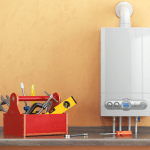Maintaining your heating, ventilation and air conditioning (HVAC) system helps to lower your monthly energy bills. Preventive maintenance also extends the system’s lifespan and protects breakdowns that make an impact on your comfort. There are four key steps to HVAC preventive maintenance that should be performed at least twice per year.
Changing the Air Filter
Changing the air filter is essential to an HVAC system’s performance, efficiency and longevity. The air filter is usually housed in its own chamber or within the air blower portion of the system. It may be framed with cardboard and disposable, or it may be reusable. A reusable filter will be cleaned and put back into the unit. A disposable air filter will be replaced. The filter should be changed every 90 days.
Cleaning the Condensate Line
In air conditioners and heat pumps, the condensate line is responsible for draining the water that is condensed during a cooling cycle. The condensate line can grow mold and algae. If the growth gets too thick, the condensate line can become obstructed. If it gets obstructed, water can back up into the equipment and cause a malfunction. Cleaning the condensate line consists of bleaching the interior of the pipe, removing algae and mold and rinsing it with plain water.
Checking the Refrigerant
Air conditioners and heat pumps use a chemical refrigerant such as R-410-A. Some companies, such as Classic Air and Heating, know that if the refrigerant tubing or chamber develops a leak, the system will not operate efficiently. The system could freeze up or simply blow room-temperature air. HVAC technicians use special equipment to check the level of the refrigerant. If it is low, the refrigerant can be charged after the leak is found and repaired.
Cleaning and Lubricating Motors and Fans
Furnaces, air conditioners, ventilation units and dehumidifiers all have motors and fans. The motors and fans can collect dust and debris that inhibits their motion. These parts are cleaned and lubricated during a maintenance visit. Proper lubrication of the motors and fans reduce the risk of overheating and minimize the amount of noise made by the unit while it operates.
HVAC maintenance should be performed by a licensed, bonded and insured provider. It is a good idea to schedule maintenance for the air conditioner in the spring and a checkup for the furnace in the autumn. Heat pumps and other equipment that is used all year long should be serviced twice per year, also in the autumn and spring to identify and repair any defects.







